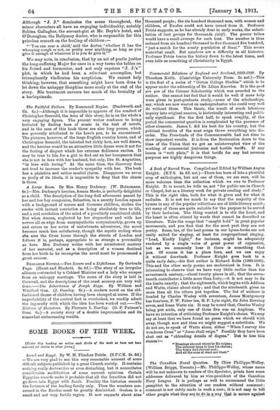A Book of Sacred Verse. Compiled and Edited by William
Angus Knight. (R.T.S. Ss. 6d. net.)—There has been of late a plentiful crop of anthologies, but not one of them, we are sure, will be more welcome than the collection which we owe to Professor Knight. It is meant, he tells us, not "for public use in Church or Chapel, but as a literary work for private reading and study." This is the right idea, both for what it gives and for *hat it excludes. It is not too much to say that the majority of the hymns in any of the popular collections are of little literary merit ; yet many of these are quite suitable for the purpose to be served by their inclusion. The thing wanted is to stir the heart, and the heart is often stirred by words that cannot be described as literature. Take the songs that "caught hold" in great popular movements, and you find that for the most part they are not poetry. Some, too, of the best poems in our hymn-books are not really suited for singing, at least for congregational singing. "Lead, Kindly Light," for instance, might be adequately rendered by a single voice of great power of expression, but as we commonly hear it there is something that jars. Of course it has a place here, and we can enjoy it without drawback. Professor Knight goes back to a quite early date,—his first author is Richard Rolle (1290-1340). This and the other early poems are modernised in form. It is interesting to observe that we have very little earlier than the seventeenth centary,—about twenty pieces in all; that the seven- teenth contributes a little more than forty,—it fa not easy to fix the limits exactly; that the eighteenth, which begins with Addison and Watts, claims about sixty; and that the nineteenth gives us more than all the others put together. The list of authors is headed by Charles Wesley with seventeen, James Montgomery has fourteen, F. W. Faber ten, H. F. Lyte eight, Sir John Bowling seven, and Isaac Watts six. It may be noted that, Charles Wesley being put aside, only one of these five was an Anglican. We have no intention of criticising Professor Knight's choice. We may say at least that we have found no poem which we should wish away, though now and then we might suggest a substitute. We do not see, to speak of Watts alone, either "When I survey the wondrous Cross" or "Jesus shall reign." Possibly they have been shut out as "obtruding details of dogma." But to lose this stanza
"Blessings abound where'er He reigns; The prisoner leaps to lose his chains ; The weary find eternal rest ;
And all the sows of. want are blest."






































 Previous page
Previous page